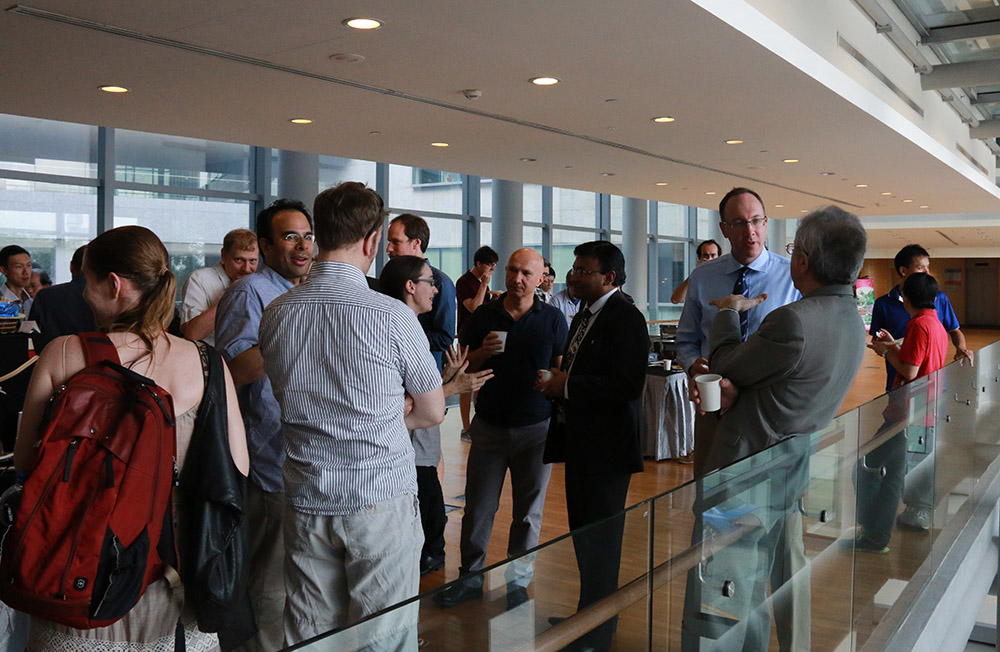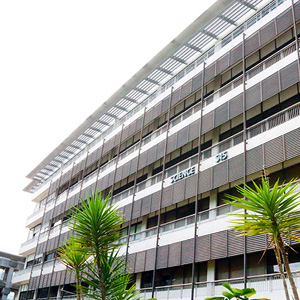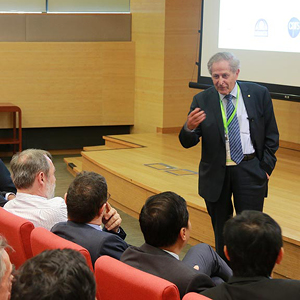Highlights
CQT hosts UK-Singapore Quantum Symposium

Twelve talks over two days showcased UK and Singapore capabilities and excellence in quantum technologies. Find more pictures from the event here.
A Quantum Symposium held 26-27 March at the National University of Singapore brought together leading researchers in quantum technologies from the UK and Singapore. The event was jointly organised by the Centre for Quantum Technologies and the British High Commission's Science and Innovation team.
Singapore's long-term investment in the Centre for Quantum Technologies and the UK's announcement in 2013 of a national Quantum Technologies Programme highlight the countries' commitment to research in this field. The event showcased UK and Singapore capabilities and research excellence in quantum technologies.
In opening the symposium, the British High Commissioner Antony Phillipson said "I am certainly no expert on quantum technology, and am not a scientist. But I was struck by a reference on the [UK] Engineering and Physical Sciences Research Council’s website that stated that many of modern day technologies that underpin the information age are derived from quantum physics in the same way that classical physics underpinned the industrial revolution of the eighteenth and nineteenth centuries. Now, I did study history, including the impact of the industrial revolution on the UK and Europe so I can appreciate the significance of what you will be discussing in the next two days and the importance of the UK and Singapore working together on this agenda."
The UK's Quantum Technologies Programme is a £270 million commitment to R&D in quantum technologies "aimed at realising their potentially transformative impact across business, government and society". Last year £120 million of this funding was awarded to establish four national 'hubs'. The hubs are collectives of university and industry partners focussed on different areas of research. The symposium in Singapore featured presentations on each of the hubs:
- UK Quantum Technologies Hub for Sensors and Metrology - presented by Peter Kruger from the University of Nottingham
- QUANTIC Quantum Enhanced Imaging Hub - presented by Steve Beaumont from the University of Glasgow
- Networked Quantum Information Technologies hub - presented by hub leader Ian Walmsley from the University of Oxford
- EPSRC Quantum Communications Hub - presented by hub leader Tim Spiller from the University of York
There were also presentations by CQT Principal Investigators on research directions in Singapore:
- Christian Kurtsiefer - presented his team's entangled photon pair source compatible with atomic transitions
- Alexander Ling - on the roadmap for and lessons learned from his ambitious project to send a source of entangled photons into orbit
- Rainer Dumke - with latest results from his experiments on superconducting atom chips
- Murray Barrett - on a candidate ion for building better optical clocks
Further excellent talks were given by UK researchers John Morton from University College London, Mete Atature from the University of Cambridge, CQT alumnus Hugo Cable, now at the University of Bristol and Edward A Hinds from Imperial College London.
Learn more
Related Stories
 | Singapore's National Research Foundation awards CQT $36.9 million funding June 12 2014 |
 | Conference marks launch of the France-Singapore Majulab February 03 2015 |






